- Home
- Herbert Strang
Barclay of the Guides Page 4
Barclay of the Guides Read online
Page 4
CHAPTER THE FOURTH
The Return of Sherdil
To pursue the fugitives was impossible in the darkness; nor, indeed,were Rahmut's men capable of further exertions. They were worn out bytwo days and nights of hard riding. Before proceeding to carry out theprime object of his expedition, the old chief had turned aside to raidthe village of an enemy near the frontier, and had scarcely completedhis work there when he was spied by a troop of the Feringhis, who chasedhim with such pertinacity that he was forced to abandon his purposedquest. Having secured, therefore, those members of Minghal's band whohad life in them and were not too severely wounded to escape, Rahmutordered the gates to be again closed and the community to rest.
Before he sought his own couch, however, the old chief heard from Ahsanthe full story of what had happened during his absence. Enraged as hewas at Minghal's action, he was still more delighted with the part Ahmedhad played. He embraced the lad fondly, called him by endearing names inthe extravagant Oriental way, and declared that, after punishingMinghal, he would devote himself in earnest to the quest of a suitablebride for his heir.
In the morning he caused all the villagers to assemble in the open spacebefore the tower, and bitterly upbraided those who had tamely submittedto the enemy. He ordered his nephew Dilasah, who had been severelywounded, to be brought out among the people, and, cursing him in thename of the Prophet, he bade all men to witness that he disowned himutterly. Then he waxed eloquent in praise of Ahmed, about whose neck hehung a chain of silver cunningly wrought, and called on the people torecognize him as their future chief. And, finally, he announced thatMinghal Khan should not go unpunished. When the time was ripe his enemyshould lick the dust.
When the assembly was dismissed, Rahmut called his chief men about himto discuss the means of taking vengeance on Minghal. Ahmed felt a glowof pride at being admitted to the council. In the ordinary way he couldnot have expected so great an honour until he had proved himself inactual warfare and become a married man. But the old chief was so muchpleased with his coolness and daring, that he was resolved to give thelad a real share in the activities of the tribe.
There was a long discussion as to the method by which reprisal might bemade on Minghal Khan. It was speedily agreed that to attack his villageopenly was impracticable, or would at least expose them to the risk ofdisaster. Minghal had lost some twenty men in the fight, but it was wellknown that he could still put eighty or ninety good warriors in thefield, whereas Rahmut had but forty or fifty. Success could only behoped for from a stratagem. But Minghal, while inferior as a warrior toRahmut, was more than his match in wiles. Rahmut, indeed, disdainedtrickery of any kind; he had won his reputation by sheer prowess andskill in generalship, and if it came to a contest in cunning, Minghalwould easily bear the palm. No doubt the wily chief would expectretaliation, and would be fully prepared to meet it. No one among thecouncil was able to suggest a likely scheme, and it broke up withouthaving come to a decision.
Two days passed, and still no plan had suggested itself. On the thirdday, there rode up to the village a tall, black-bearded horseman clad inworn and tattered garments of dust colour, and carrying sword, lance andcarbine. When he had come within a short distance of the gate Ahsanshouted--
"Halt, there! Who are you, and what is your business?"
"Knowst thou me not, Ahsan?" came the reply. "Dost not remember Sherdil,son of Assad? Thou didst thrash me often enough, and truly the soft partof me will never forget thy thwackings."
"Why, Sherdil, thy beard has grown since those days. I remember theewell. Come in, and say why thou ridest in garments of so strange amake."
Sherdil rode in, eyed curiously by the crowd of men and boys whom thebrief conversation had drawn to the spot. He was a magnificent specimenof a Pathan, tall, handsome of feature, well made, and his horse was amatch for him. Dismounting, he led his horse by the bridle and went topay his respects to the chief.
Sherdil had left the village nearly eight years before, when he was ayouth of seventeen. He had been the wildest and most unruly boy of thetribe, always in mischief, showing no respect for his elders--one day hehad called a holy sayad "old scaldhead," and laughed when his fatherthrashed him for it. He had been incorrigibly lazy at school: not allthe mullah's thwackings drove into his thick head the scraps from theKoran which formed the greater part of his lessons, and he was alwaysvery rebellious at having to fast from sunrise to sunset in Ramzan, theninth month. But in tent-pegging and racing and sword-play he beat allboys of his age, and indeed many of the men; and when he insisted onjoining them in their expeditions, which happened at the age of sixteen,he excelled them all as a highway robber and a horse-thief.
When he was seventeen he ran away, and nothing had since been heard ofhim. His mother grieved, for he was her firstborn; but his father,having three more sons, was not greatly distressed, for the boy hadalways been a trouble to him. And now he had come back, grown out ofknowledge, with a fine black beard and the look of a seasoned warrior.
His father, Assad, as in duty bound, made a great feast in honour of thereturned prodigal. He invited a great number of his neighbours, andregaled them with the flesh of sheep and goats and--this was a greatluxury--fowls, and beautifully light chapatis baked by his wife Fatimaherself, and luscious sweetmeats made of honey and ghi; but the onlydrink was water. And having been well fed, Sherdil related the story ofhis life since he had left Shagpur--a good riddance, as most of the folkthought.
It was a stirring tale, of wild doings on the borders, among men whokept the passes into the hills and lived amid inaccessible rocks, whencethey swept down upon unsuspecting travellers and merchants in theplains, and even pushed their forays across the frontiers among thesahib-log. His audience uttered many an exclamation of wonderment andadmiration as he recounted his exploits, and you may be sure he did notminimize them. The men about him were robbers and brigands and murderersthemselves, but their deeds faded into insignificance beside the boldand desperate adventures of Sherdil. Ahmed, who was among the company,listened with all his frame thrilling. He had a faint recollection ofSherdil as a big fellow who, rough as he was, had treated him with acertain kindness, and had shown him first how to snare a rabbit. And hefelt a good deal of envy of this fine stalwart fellow who had seen anddone so much.
One story of Sherdil's made the company hilarious. The chief to whom hefor a time attached himself--one Dilawur, a native of Jahangia, avillage on the Cabul river--heard one day that a wealthy Hindushopkeeper was to be married. He instantly determined to profit by thebridegroom's happiness. With his men, among whom Sherdil was one, he layin wait on the bank of the Indus at a place which the Hindu must pass onhis way to the bride's house. When the expectant bridegroom came insight, all bedizened with wristlets and chains and jewels, the brigands,armed with pistol, sword and dagger, fell upon the party, seized theluckless man, dragged him to the river bank, and thrust him into aninflated cow-hide. Then Sherdil mounted upon this monstrous bladder, andpaddled it across the river. When the rest were across, the Hindu wascarried away into the hills, and Dilawur's scribe--for he could notwrite himself--penned a letter to his sorrowing friends, informing themthat their relative was well and happy, and would be restored to themfat and jolly for the little sum of two hundred rupees.
"Wah! wah!" said the company in chorus. "And what next, O lion of thehills?"
And Sherdil, whose name means "lion-hearted," chuckled and said--
"Why, did ye ever know a Hindu who would pay a price without bargaining?And the richer they are, the more they haggle. 'Two hundred rupees? No,no: we cannot afford that. The sickness fell on our goats last winter;we are very poor; our friend is very dear to us, but he will be too dearif we pay that price. We will give a hundred rupees, when we are sureour friend has lost no flesh.' But Dilawur Khan has not the patience ofa camel. When he got their foolish answer he sent me with anotherletter, saying that if the two hundred rupees were not in his handswithin seven days, he would strike off their dear relative's head
andsend it them as an offering of peace; only having been at the expense offeeding him with good fattening food all that time, he would require twothousand rupees as recompense."
"Wah! wah!" shouted the delighted hearers, to whose sense of justicethis appealed no less than to their sense of humour; "and what was theanswer?"
"Why, the answer was two hundred rupees, full tale, and a present ofgoats beside. And the Hindu--whom fear and the delay of his marriage hadmost marvellously thinned--was restored to his home, with good wishesfor a long life and many sons--for our sons to pluck likewise."
And in the midst of the laughter this story evoked, one of the guestsasked a question--
"But why, O Sherdil, hast thou given up the dress of thyforefathers--the chogah, and the blue trousers drawn in at the ankles,and the sandals? Why dost thou wear this strange garb, like the dust ofthe plain or corn of the fields in colour?"
"Eha, that is a strange story too," said Sherdil, and he drew himselfup. "I am a servant of the sahib-log."
"Hai! hai!" gasped the company in astonishment. "A servant of thesahib-log! the accursed Feringhis! sayest thou, O Sherdil?"
"'Tis true. My coat is the colour of corn, say you? yes, but it is thecolour of the lion also. Is not my name Sherdil? A great sahib, his nameLumsden, heard of me; he knows everything; no man who does brave deedsescapes him. Having heard of my great daring in the hills, he sent oneto me who had served him long and was as brave as myself, and begged me,if it were not too much trouble, to go and see him. And then he spokefairly to me: the sahibs are just and speak true; he told me that he hadlearnt somewhat of my doings, and asked whether it would suit my honourto join a company of warriors like myself--Afridis and Gurkhas, Sikhsand Hazaras, Waziris and even Kafirs, many bloods but one spirit. Andbefore I made my answer he showed me them at their sports, and verily,brothers, never did I see such skill among so many men. I saw them throwthe spear at a mark, and doing nazabaze, which is, to fix a stake of aspan length in the ground and take it up on the spear's point whenpassing at a full gallop; and, for another sport, putting an orange onthe top of a bamboo three spans high, and slicing it through with thesword as they ride by at full speed. 'By my beard!' I thought, 'theseare fit mates for me;' and I asked the sahib whether I might try thenazabaze myself. And he allowed me, and when I caught up the stake on myspear point he smote his hands together and said words in his tongue toHodson Sahib that stood by him, and then he offered me good wages to beone of his men--Guides, they call them. And I agreed, and therefore itis, my friends, that I wear this garb, which being of the colour ofearth cannot be seen from afar so clearly as our own garments."
Assad, for the first time in his life proud of this son of his, swelledwith gratification.
"Well did I name thee Sherdil, my son," he said. "But tell us, what dostthou do for the pay these Feringhis--curst unbelievers--give thee?Assuredly it is easy work, or thou wouldst not do it."
Sherdil laughed.
"You ask what we do, my father--we of Lumsden Sahib's Guides. We do whatwe are bid to do--is not that strange? It is strange to me myself, Iown; for I never did what you bade me, father. But with thesahibs--well, that is a different matter. They say, Do this! and we doit, with a cheerful countenance. Canst thou see Sherdil handling apick-axe? Say we have no water, and the sahib wishes a well to be sunk.We of the Guides do it, and I, Sherdil, am the most diligent among them.Say we need bricks to make a wall; the sahib bids us mould the clay andburn it, and lo! the bricks are made. Say the sahib desires to goa-hunting--and a mighty hunter he is, by Allah!--he bids us go into thejungle as beaters, and gives us rounds of ammunition for ourselves. Andif we do well in our tasks, he gives us goats and rice, and after thefeast we sing songs and make merry."
"But this is not work fit for warriors of the hills," said Assad,looking a little blank. "Dost never fight and steal?"
"To steal is forbidden," replied Sherdil; "it is against the sahibs'law. But fight!--do we not fight, my father! Didst never hear how wefought at Multan, with Fatteh Khan? And how we took the fort ofGoringhar, Rasul Khan being our leader? Lo! I have many tales to tell;they will last the days of my leave. Yes, we fight, when we get thechance. Why, only four days ago we spied a troop of fifty or morehill-men away there in the hills, and we chased them for two days andnights, but they would never stand to take a shot at us, so much are wefeared."
Inquiry soon discovered that Sherdil had been among the troops which hadkept Rahmut Khan on the run, and loud was his laughter when he learntthat it was his own chief whom they had been chasing. He became serious,however, when he heard of what had befallen the village during thechief's absence, and cursed Minghal Khan with the true vigour of aPathan. And on being told that no plans had yet been formed for thepunishment of the offender, he vowed by the beard of the Prophet thatsome way should be found before his leave was expired.
Next day he sought an interview with the chief, and had not been inconversation with him more than half-an-hour before Rahmut called hiscouncil together and asked their opinion of an enterprise Sherdil hadsuggested. It won their hearty admiration. One of Minghal's sources ofrevenue consisted of a tribute levied on traders passing to and fromCentral Asia. Their route lay within a few miles of his village, and,indeed, sometimes they made use of a change-house in it. They usuallytravelled in bodies of considerable size, and sufficiently well armed tooffer a good defence against marauders. But they found it profitable toplacate the principal chiefs through whose territories they passed bypaying a tribute varying with the importance of the chiefs; and thechiefs on their side recognized that their interests were better servedby the regular income thus derived than by forays which might or mightnot be successful, and which would ultimately have the effect of scaringaway the trade caravans altogether.
Sherdil had suggested that advantage of this fact might be taken topractise a trick on Minghal. He proposed that a small party of Rahmut'smen should be equipped as traders, and thus gain admittance to Minghal'svillage. Then, at night, they might find some means of seizing histower, and while the village was in confusion Rahmut could attack itwith the main body of his men.
The old chief himself, true to his character, was at first reluctant tofall in with this cunning scheme. He pointed out that Minghal's attackon his own tower had failed, and foresaw many possibilities of failurein the proposed adventure. He would have preferred to wait until hecould have gathered a sufficient reinforcement to enable him to make adirect attack in force on his enemy. But Sherdil laughed away hisdoubts; the burden of his reasoning was that against a wily enemy likeMinghal, wiles must be employed. And as for the matter of the tower, anda possible failure there, that was not worth considering.
"Minghal had no Sherdil and no Ahmed," he said, with a magnificentgesture. "I, Sherdil, have learnt somewhat from the sahibs, and has notAhmed the blood of sahibs in his veins? We are more than a match forMinghal, believe me."
Rahmut frowned, and threw an anxious glance at Ahmed when this referencewas made to his English birth. This admiration of the sahibs was littleto his liking; but he discreetly said nothing of what was passing in hismind, and the general opinion being favourable to the scheme, he gavehis assent to it. Then he threw himself keenly enough into thepreparations suggested by Sherdil. He declared that if the stratagem wasto be attempted, it must be done thoroughly. Any carelessness wouldinvite discovery, and discovery would mean death to those engaged in it.
Sherdil undertook the arrangements. The first step was to select themembers of the pretended trading party. Five well-tried warriors werechosen from among those who had accompanied the chief on his recentexpedition. Having been absent from the village during Minghal's attack,they were not likely to be recognized by his men when they entered hisvillage. And Sherdil himself begged that Ahmed might be allowed to jointhe party. To this the chief at first objected. The enterprise wasfraught with great danger; Minghal would like nothing better than to getthe chief's heir into his hands; and Ahmed, having taken so prominent apart in th
e defence of the tower, would certainly be recognized. ButSherdil had conceived a great admiration for the part Ahmed had playedin resisting Minghal's raid, especially for his exploit in blowing upthe powder. He assured Rahmut Khan that the lad could easily besufficiently disguised; Ahmed himself pleaded very hard to be allowed tojoin the expedition; and the old chief at last, bethinking himself that,if successful, it might serve as an additional bond between Ahmed andthe villagers and strengthen his consideration with them, gave hisconsent.
"Go, my son, and God go with thee," he said, laying his hands fondly onthe boy's head. "But come back to me, for I am well stricken in years,and I would fain go to the grave happy, knowing that thou wilt be lordof Shagpur, and not Dilasah."

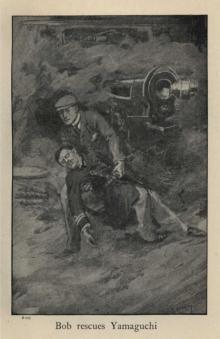 Kobo: A Story of the Russo-Japanese War
Kobo: A Story of the Russo-Japanese War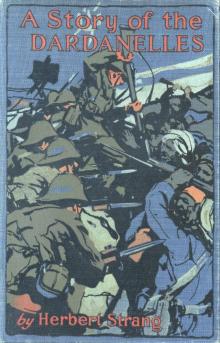 Frank Forester: A Story of the Dardanelles
Frank Forester: A Story of the Dardanelles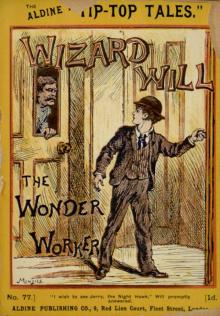 Wizard Will, the Wonder Worker
Wizard Will, the Wonder Worker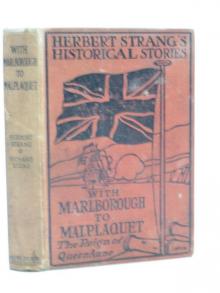 With Marlborough to Malplaquet: A Story of the Reign of Queen Anne
With Marlborough to Malplaquet: A Story of the Reign of Queen Anne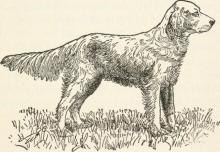 The Dogs of Boytown
The Dogs of Boytown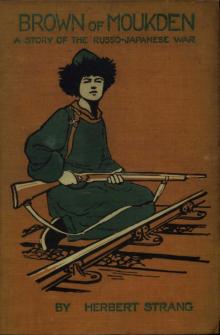 Brown of Moukden: A Story of the Russo-Japanese War
Brown of Moukden: A Story of the Russo-Japanese War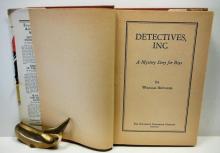 Detectives, Inc.: A Mystery Story for Boys
Detectives, Inc.: A Mystery Story for Boys Bright Ideas: A Record of Invention and Misinvention
Bright Ideas: A Record of Invention and Misinvention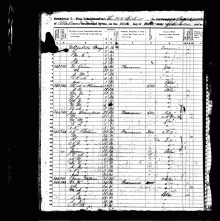 Lost in the Cañon
Lost in the Cañon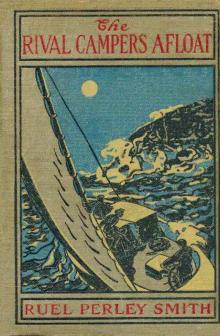 The Rival Campers Afloat; or, The Prize Yacht Viking
The Rival Campers Afloat; or, The Prize Yacht Viking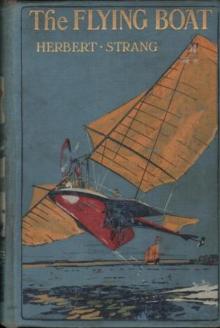 The Flying Boat: A Story of Adventure and Misadventure
The Flying Boat: A Story of Adventure and Misadventure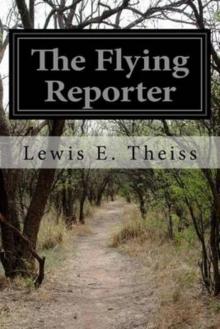 The Flying Reporter
The Flying Reporter Jack Hardy: A Story of English Smugglers in the Days of Napoleon
Jack Hardy: A Story of English Smugglers in the Days of Napoleon No Man's Island
No Man's Island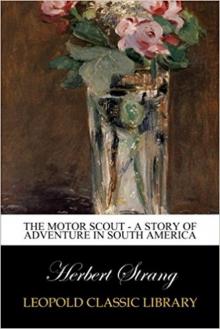 The Motor Scout: A Story of Adventure in South America
The Motor Scout: A Story of Adventure in South America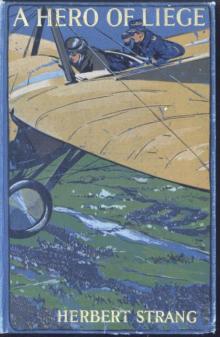 A Hero of Liége: A Story of the Great War
A Hero of Liége: A Story of the Great War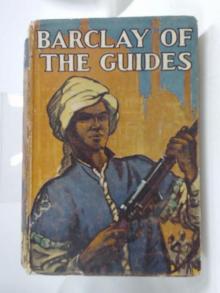 Barclay of the Guides
Barclay of the Guides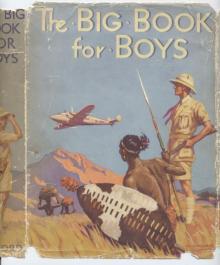 Carry On! A Story of the Fight for Bagdad
Carry On! A Story of the Fight for Bagdad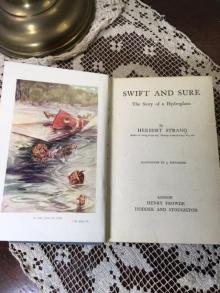 Swift and Sure: The Story of a Hydroplane
Swift and Sure: The Story of a Hydroplane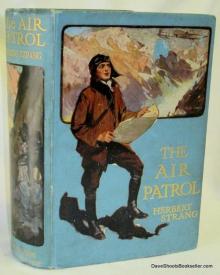 The Air Patrol: A Story of the North-west Frontier
The Air Patrol: A Story of the North-west Frontier Boys of the Light Brigade: A Story of Spain and the Peninsular War
Boys of the Light Brigade: A Story of Spain and the Peninsular War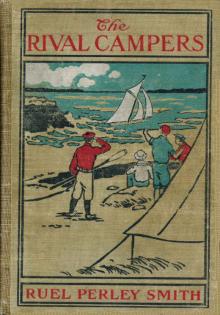 The Rival Campers; Or, The Adventures of Henry Burns
The Rival Campers; Or, The Adventures of Henry Burns Palm Tree Island
Palm Tree Island The Friends; or, The Triumph of Innocence over False Charges
The Friends; or, The Triumph of Innocence over False Charges Maggie's Wish
Maggie's Wish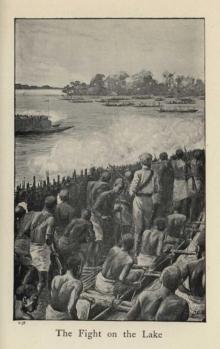 Tom Burnaby: A Story of Uganda and the Great Congo Forest
Tom Burnaby: A Story of Uganda and the Great Congo Forest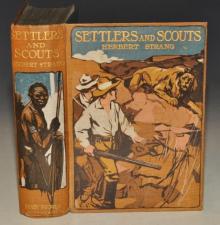 Settlers and Scouts: A Tale of the African Highlands
Settlers and Scouts: A Tale of the African Highlands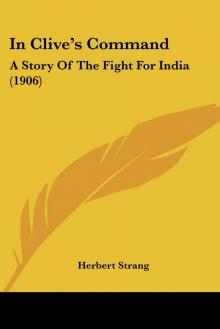 In Clive's Command: A Story of the Fight for India
In Clive's Command: A Story of the Fight for India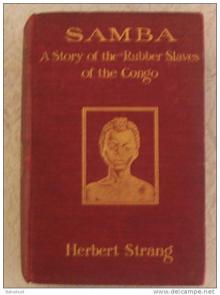 Samba: A Story of the Rubber Slaves of the Congo
Samba: A Story of the Rubber Slaves of the Congo The Auto Boys' Quest
The Auto Boys' Quest Tom Willoughby's Scouts: A Story of the War in German East Africa
Tom Willoughby's Scouts: A Story of the War in German East Africa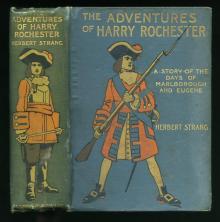 The Adventures of Harry Rochester: A Tale of the Days of Marlborough and Eugene
The Adventures of Harry Rochester: A Tale of the Days of Marlborough and Eugene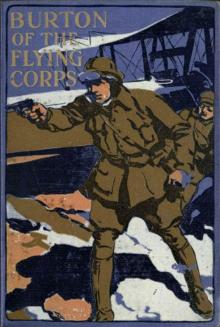 Fighting with French: A Tale of the New Army
Fighting with French: A Tale of the New Army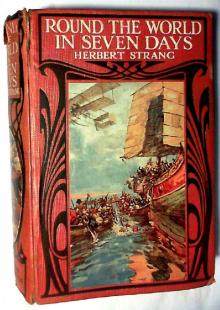 Round the World in Seven Days
Round the World in Seven Days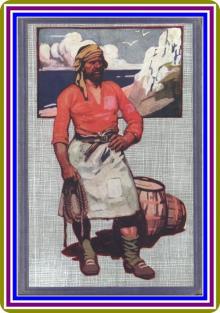 The Adventures of Dick Trevanion: A Story of Eighteen Hundred and Four
The Adventures of Dick Trevanion: A Story of Eighteen Hundred and Four